Kraftwerk - Kraftwerk-The Influence
by Jon Rogers
published: 24 / 9 / 2009
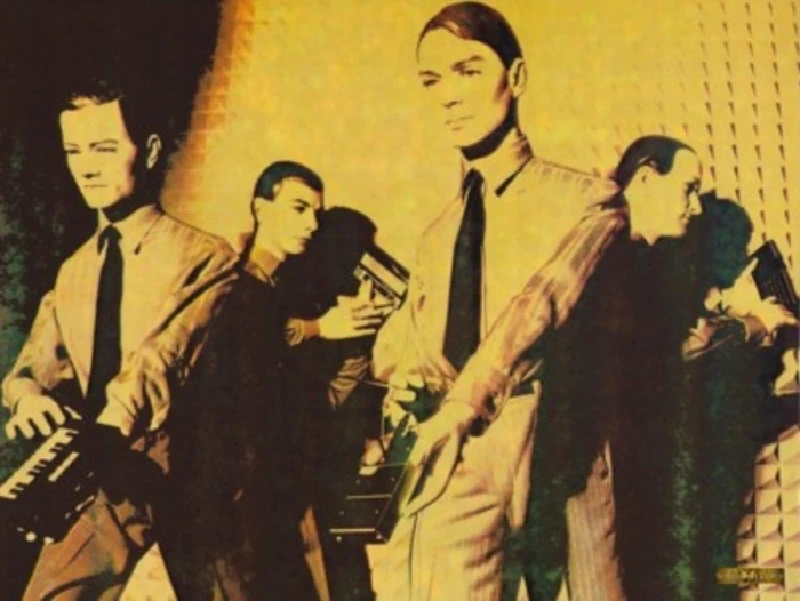
intro
...while in the second part he looks at their influence on acts as diverse as David Bowie, Afrika Bambaataa and Ian Dury
The members of German electronic pioneers Kraftwerk make for unlikely veneration. Here were four white, middle class Germans from Düsseldorf who, while famous, hardly courted the media circus, hardly lived the cliché of rock star hedonism and self-indulgence. Instead they preferred the more anonymous confines of their Kling Klang studio, beavering away quietly, perfecting their latest album and viewing the studio like some laboratory of sound with the musicians in search of some alchemist quest. And yet the band is one of the most highly venerated and respected of the late twentieth century and are essential to the history of modern music. It’s a pretty pointless exercise but can you imagine what dance music would be like without them? The likes of Autechre, Orbital and the Aphex Twin would be in very different guises, if they existed at all. There’s the obvious sampling of 'Trans-Europe Express' by Afrika Bambaataa in 1982 for the album ‘Planet Rock’. "Kraftwerk - I don't think they even knew how big they were among the black masses back in 1977 when they came out with 'Trans Europe Express'. When that came out I thought that was one of the best and weirdest damn records I ever heard in my life. That's an amazing group to see -jus' to see what computers and all that can do."--Afrika Bambaataa told 'The Face' in 1984. But artists like the Chemical Brothers, Fat Boy Slim and the Orb have all used samples of the band’s work. ‘Planet Rock’ may have broken new ground, in part thanks to the production of Arthur Baker, but the German pioneers weren’t happy. According to Wolfgang Flür, the band’s long standing percussionist that played with the band from 1974's ‘Autobahn’ to 1986's ‘Electric Café’, samples of ‘Numbers’ and ‘Trans Europe Express’ were lifted for the album without getting permission first and neither did they receive any royalties with Flür describing it as “the nastiest type of theft!” Ultimately though the record label, Tommy Boy, had to cough up the cash with the company simply increasing the cost of the record by a dollar in order to pay the fine. The German electronic band has had a particularly strong influence on US dance music with both Detroit techno and Chicago house particularly drawing on their music. Keith Farley’s ‘Funkin’ with the Drums Again’, Cybotron’s ‘Clear’ and Model 500’s ‘No UFOs’ all owe a big debt to the band. It can all become rather trainspotter-ish hunting out where artists have sampled Kraftwerk’s music and the internet is full of sites listing these references and there’s little point in also donning the anorak. But the band also set the template for a whole horde of pop synth acts in the UK. Ultravox, Orchestral Manoeuvres in the Dark (OMD), Human League and Cabaret Voltaire all took the basic blueprint and style of Kraftwerk and adapted it. And so did Depeche Mode, particularly in the early days and would use Kraftwerk samples on the 2001 album 'Exciter'. Depeche Mode’s Martin Gore in Jonathan Miller’s biography of the band ‘Stripped: Depeche Mode’ says, “Obviously we were influenced by Kraftwerk, but there was a bit of a scene going on then [1979]. There were quite a few bands like The Human League”. Andy Fletcher added, “There was this new scene with, I suppose, the early Human League and Kraftwerk – people were really getting into synthesisers.” David Gahan admits to listening to “a lot of Bowie, Roxy Music, Kraftwerk, stuff like that” too. For him the German quartet had “instant melody”. The band would pay homage in particular with the song ‘World in My Eyes’ from 1990's ‘Violator’. It wasn’t perhaps surprising that Depeche Mode were signed to the independent label Mute, run by Daniel Miller who just happened to be a big fan of ‘Krautrock’. And many acts like Mantronix appear not to take the birth of modern dance music with the likes of James Brown, Sly Stone and George Clinton (to name but a few) but with the cool, detached glide of Kraftwerk. These bands didn’t just co-opt the sound of Kraftwerk, what Ralf Hütter, the band’s leader, described as “electronic ballet” with its use of melodic repetition but also the look of the “man machine”. To visualise ‘The Man-Machine’ the band looked to ape the work of Russian constructivist El Lissitzky, but also parodied it at the same time. Using the style of diagonal bold reds and blacks the band were photographed looking like robots in similar attire with slicked back hair. A look almost entirely adopted by Gary Numan, who also added a sci-fi android feel, for his moment in the sun with singles like ‘Cars’ and ‘Are ‘Friends’ Electric?’ And groups like Ultravox and Depeche Mode would also copy Kraftwerk’s visual look on stage too. While rock gigs would usually be energetic affairs with, usually the lead guitarist and vocalist jumping and leaping about the place attired in the traditional garb of jeans and a T-shirt, these new electronic bands though copied Kraftwerk in going more for smarter shirts and trousers and even suits and ties. And this new wave of electronic acts kept activity on stage to a minimum, often simply being physically restrained by having to stand behind a keyboard. But even then, just like Kraftwerk, the musicians would invariably make as little movement as possible. Kraftwerk’s 1978 album, which went on to sell over 100,000 copies in the UK mainly due to it containing the band’s only hit single ‘The Model’, commented on the intricate relationship between humans and machines and its dehumanising affect. But as Hütter commented at the time, “The dynamism of the machines, the ‘soul’ of the machines, has always been a part of our music. We are playing the machines, the machines play us. It is really the exchange and friendship we have with the musical machines which make us build a new music.” The band set the template for pristine, graceful crystal shards of music that would invariably be initially improvised in the studio before being painstakingly chiselled and chipped into shape over many months with Hütter and Florian Schneider, the main two leaders of the group, laboriously paying attention to the tiniest details. And these new UK electronic bands picked up on similar lyrical themes that concerned Kraftwerk, mainly the modernist relationship of humans to their technological environment. On albums like ‘Trans Europe Express’ in 1977, ‘Autobahn’ (1974) as well as ‘2003's Tour de France’ the Germans picked up the themes of travel and movement and the relationship they had in getting to their destination. A theme picked up by Gary Numan on his single 'Cars': “Here in my car, I feel safest of all, I can lock all my doors, In cars.” Admittedly Kraftwerk were, by far, not the first to incorporate what were, effectively, Futurist ideas about technology into music nor trying to mimick the sound of those machines. Arthur Honegger’s symphonic poem 'Pacific 231' sculpted the sound of a train into the music way back in 1923. And French electronic pioneer Pierre Schaeffer effectively sampled the sound of a train on ‘Étude aux chemins de fer’ in 1948. As well, German contemporaries of the band – collectively dubbed ‘Krautrock’ after a track by Faust – mined a similar musical, if not visual field. Experimental bands like CAN, Harmonia and Neu! all minded a similar filed of electronic experimentation using repetitive rhythmic patterns but still with a dynamic edge. Both Kraftwerk’s ‘Autobahn’ and CAN’s ‘Yoo Do Right’ both had musical phrases that were constantly repeated and stretched for well over 20 minutes or so. An aspect that would influence drone rock bands later still like Spacemen 3 and Loop. And the four Germans have had an impact on more mainstream rock acts with Coldplay lifting the melody from 1981 Kraftwerk song ‘Computer Love’ for the song ‘Talk’. Apparently singer Chris Martin wrote Hütter and Schneider a handwritten fan letter to ask permission to use the music. And surely Franz Ferdinand were paying homage to the band on their song ‘Walk Away’? The band’s influence even stretches to the unlikely US Devo who ironically sampled clips from ‘It’s More Fun to Compute’ on ‘Post Post-Modern Man’. Even those arch-ironists and Dadaists The KLF – also infamous for sampling – pilfered from ‘Home Computer’ for ‘What Time is Love?’. And where would the likes of New Order be without the band? It is suspected that the band might have sampled from ‘Radioactivity’ for their biggest hit ‘Blue Monday’ but the jury seems to be still out on that issue. Perennial New Romantics and exponents of conspicuous consumption and living the high life Duran Duran even used 1978's ‘The Robots’ as the band’s intro tape during their tour in 2005. Even pop chameleon Madonna isn’t immune with the title track of her album ‘Music’ baring, rhythmically, more than a passing resemblance to Kraftwerk. The band’s influence also stretches to a number of post-rock acts like Insides and their earlier incarnation, Earwig. In the May 1994 issue of 'The Wire' the group’s guitarist Tardo stated that the biggest influence on his playing was the German quartet. Elvis Costello has also fallen under the band’s spell. He told Greil Marcus in Rolling Stone in September 1982 that whilst he had been working on ‘My Aim is True’ he’d been listening to ‘Autobahn’, as well as David Bowie’s ‘Low’ and Iggy Pop’s ‘Lust for Life’ – and Abba’s ‘Arrival’. There is a comical anecdote in Flür’s 2000 book, 'I Was a Robot' and account of his time in the band when they played the Venice Bienniale alongside a variety of musicians like Ian Dury and the Average White Band. After the gig Flür is dancing away to the latest disco hits of the day when Dury appears with two “professional lovers” (as Flür describes them) and proceeds to knock back whisky after whisky at the bar. After a while Dury, now rather drunk, asks Flür to dance, who by his own admission is also drunk, and so the two dance away with the rather short Dury, who was also disabled, perched on the feet of Flür and clinging on to him like a “spider monkey”. Perhaps though the biggest respect for the band came from David Bowie – and the feeling was mutual. The Germans went to see Bowie play in Frankfurt in 1976 during his 'Station to Station' tour, driving there in Schneider’s Mercedes 600 and the band were suitably impressed. The band name checked the British singer the following year in the song ‘Trans-Europe Express’. And Bowie was taken by the band, particularly Schneider and Hütter. Discussions on more than one occasion were held at the band’s Kling Klang studio about the possibility of a collaborative album and tour but nothing was to come of it. While Bowie would make the influence of ‘Krautrock’ explicit on his Berlin trilogy of albums it first became apparent on the title track of ‘Station to Station’ where Bowie utilised the band’s motorik pulse. The influence would become more apparent in the autumn 1975 when Bowie worked on the soundtrack to the film 'The Man Who Fell to Earth'. Bowie teamed up with the classically trained Paul Buckmaster who had worked on ‘Space Oddity’ and the pair worked out of Bowie’s house in Bel Air, listening to Kraftwerk’s ‘Autobahn’ and ‘Radioactivity’. “We both enjoyed their records very much,” remembers Buckmaster. “We kind of took them seriously, but we kind of laughed as well. Not at it, but because the music had a kind of innocent quality which was very fetching, and a deadpan humour as well.” Ultimately, the music wasn’t used although the reasons why don’t seem clear but probably the director Nicolas Roeg just simply didn’t like it and thought it wasn’t up to scratch. “I think Roeg got cold feet about it,” says Buckmaster. “I considered the music to be demo-ish and not final, although we were supposed to be making it final. We also didn’t have a producer at the time and we were trying to hammer it out together. All that produced something that was substandard, and Nic Roeg turned it down on those grounds.” It wouldn’t have helped that both Buckmaster and Bowie had a escalating cocaine habit as well. The work done though on the moody, instrumental music wouldn’t go entirely to waste and would form the starting point for the tracks on the second side of Bowie’s groundbreaking album ‘Low’. Although the only music actually used from 'The Man Who Fell to Earth' on ‘Low’ would be a backwards bass line, played by Buckmaster, on the track ‘Subterraneans’. Along with Kraftwerk, Lou Reed’s ‘Metal Machine Music’ and Robert Fripp and Brian Eno’s ‘No Pussyfooting’ were Bowie’s music of choice on his 1976 tour of America where ‘Station to Station’ opened the set. The initial idea had been to get Kraftwerk to open for Bowie but the logistics of transporting all of the band’s equipment as well as Bowie’s just proved to be too much hassle. Instead, the band’s ‘Radioactivity’ played as Bowie took the stage to a backdrop of Luis Bruñel and Salvador Dali’s surrealist short film 'Un Chien Andalou'. The influence of Kraftwerk on Bowie though would reach a peak when he teamed up with musician Brian Eno, who was also under the influence of the German band. Along with the Kraftwerk the pair were also very familiar with other experimental electronic groups like Cluster and Neu! The influence of these bands is all over ‘Low’ and “Heroes”. On the latter, Bowie repaid the namecheck by Kraftwerk by penning ‘V-2 Schneider’, saluting the Kraftwerk musician. The influence of Kraftwerk and the other German bands is quite obvious with tracks like ‘Warszawa’ and ‘Art Decade’ awash with synthesizers and soundscapes and decorated with spectral overdubs. If that wasn’t potentially interesting enough Flür in his memoirs, also states that they received a proposal from Michael Jackson’s management about a possible collaboration. How seriously the band considered it isn’t noted. The good, the bad and the ugly have all attempted – with varying degrees of success to cover the band. There are a whole host of, usually, second-rate albums filled with dance acts either covering songs or creating “music inspired by...” Who are Basskraft and why would I want to listen to their “bass tribute” to the band? ‘Kraft Trance Express’ is full of obscure dance acts doing their take on songs like ‘The Robots’ and ‘Music Non Stop’. A similar thing could be said for ‘Trancewerk Express’. But there have been a few interesting covers of note. US hardcore outfit Big Black scuffed up ‘The Model’ just enough on their album ‘He’s a Whore’ to turn it from haute couture to street wear. From one extreme to another. The Balanescu Quartet also tackled a number of the band’s songs on ‘Possessed’ in 1992 including ‘The Robots’ and ‘The Model’ giving the songs a string quartet makeover. The Members gave a dub reggae feel to ‘The Model’, which sounds intriguing at the very least. Indie outfit Luna, headed by the former Galaxie 500 frontman Dean Wareham took on ‘Neon Lights’, to some success. U2 also covered the same song for the B-side of ‘Vertigo’. If that wasn’t bad enough Simple Minds have also had a go at covering the same song. One cover particularly annoyed Flür, Rammstein’s cover of ‘The Model’, which was the worst he’d heard and recommended the band listen to a previous one by Snakefinger done in 1979. Perhaps the last word on the lasting influence and impact of the band better go to Wolfgang Flür who wrote in his memoir: “The music of Kraftwerk was so new, and for this reason our songs are still being copied mechanically, stolen and sampled throughout the world, because they’re timeless and continue to be an inspiration to others
Band Links:-
http://www.kraftwerk.com/https://www.facebook.com/KraftwerkOfficial/
https://twitter.com/kraftwerk
Picture Gallery:-
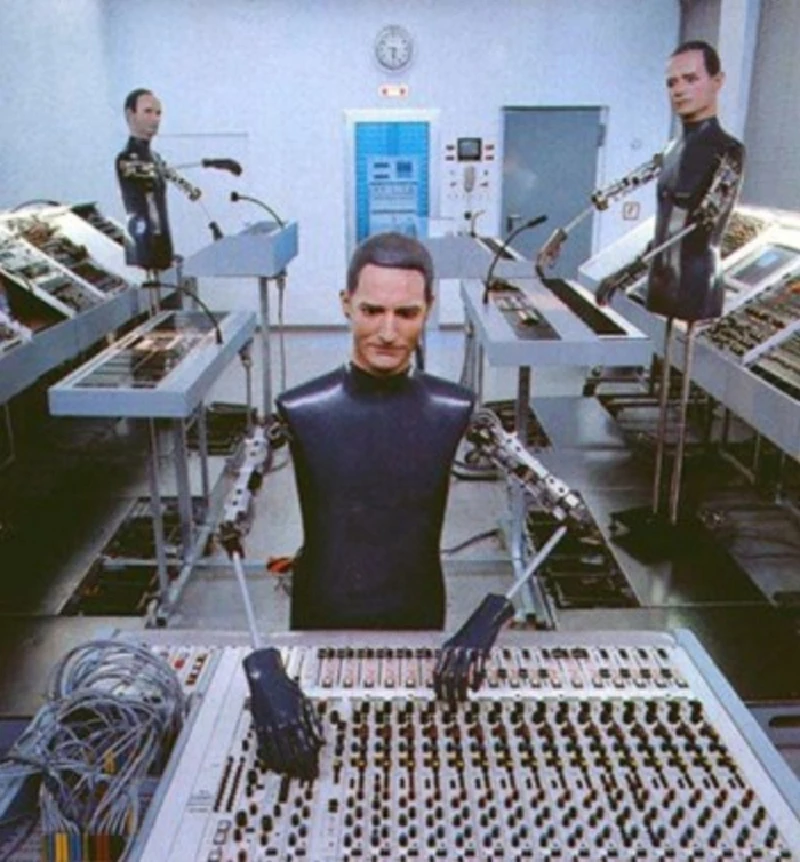
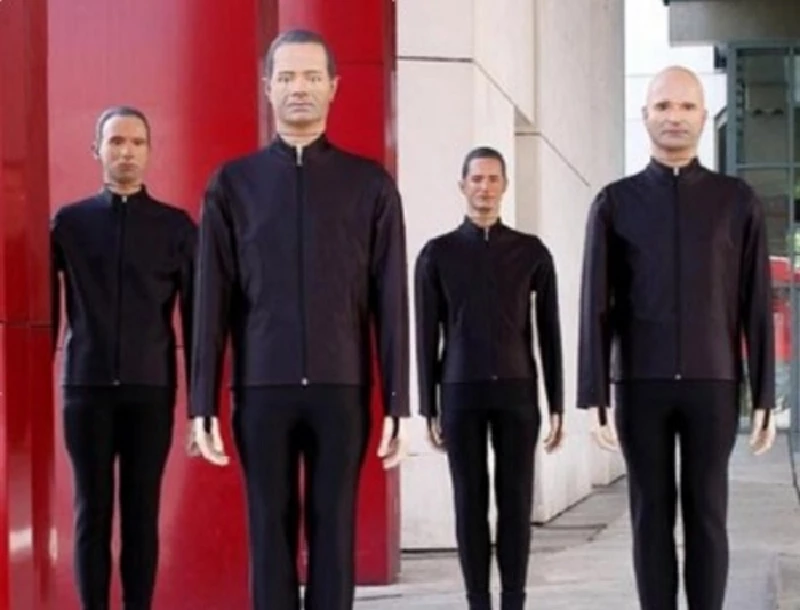
profiles |
|
Kraftwerk-The Catalogue (2009) |
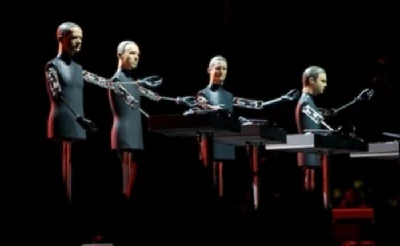
|
| Jon Rogers, in the first part of a two part profile, examines the history of seminal German electro outfit Kraftwerk, and 'The Catalogue', a new box set, which collects together all their albums between 1974 and 2003... |
live reviews |
|
New Theatre, Oxford, 6/6/2017 |
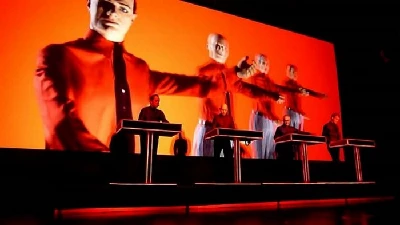
|
| Nick Dent-Robinson finds electronic pioneers Kraftwerk still sounding futuristic with a set of their now classic material at the New Theatre in Oxford |
features |
|
The Image That Made Me Weep (2022) |
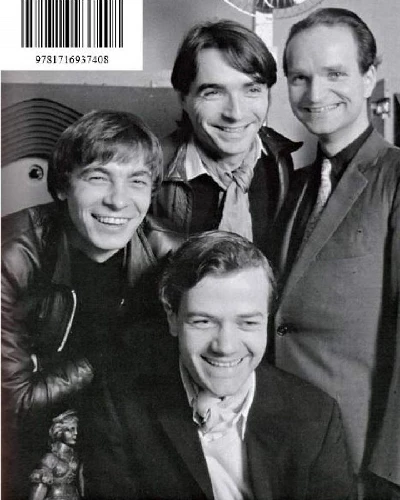
|
| In our column 'The Image That Made Me Weep', in which our writers write about the impact of a particular photo or image on them, Tommy Gunnarsson writes of a rare photo that finds Kraftwerk smiling. |
reviews |
|
Minimum-maximum (2005) |
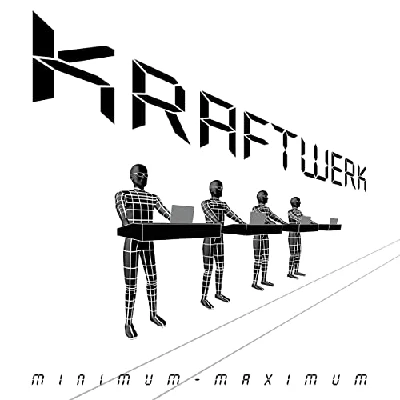
|
| Impressive double CD and first official live album, recorded during last year's universally praised world tour, from seminal German electronic pioneers Kraftwerk |
| Tour De France Soundtracks (2003) |
most viewed articles
current edition
Carl Ewens - David Bowie 1964 to 1982 On Track: Every Album, Every SongEditorial - July 2025
Billie Eilish - O2 Arena, London, 10/7/2025
Bathers - Photoscapes 2
Bathers - Photoscapes 1
Hothouse Flowers - Photoscapes
John McKay - Interview
Cleo Laine - 1927-2025
Simian Life - Interview
the black watch - Interview
previous editions
Heavenly - P.U.N.K. Girl EPTrudie Myerscough-Harris - Interview
Pixies - Ten Songs That Made Me Love...
Boomtown Rats - Ten Songs That Made Me Love....
Fall - Hex Enduction Hour
Peter Paul and Mary - Interview with Peter Yarrow
Sam Brown - Interview Part 2
And Also The Trees - Eventim Apollo, London, 21/12/2014.
Doris Brendel - Interview
Place to Bury Strangers - Interview
most viewed reviews
current edition
Sick Man of Europe - The Sick Man of EuropeAmy Macdonald - Is This What You've Been Waiting For?
Phew, Erika Kobayashi,, Dieter Moebius - Radium Girls
Alice Cooper - The Revenge of Alice Cooper
Blueboy - 2
Lucy Spraggan - Other Sides of the Moon
Cynthia Erivo - I Forgive You
Bush - I Beat Loneliness
Davey Woodward - Mumbo in the Jumbo
Philip Jeays - Victoria
related articles |
|
Wolfgang Flur: Interview (2015 |
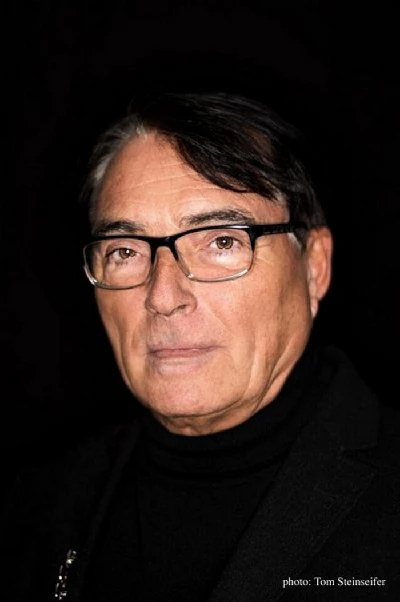
|
| John Clarkson speaks to former Kraftwerk drummer and percussionist Wolfgang Flür about his new retrospective 'Eloquence', which compiles all his pop recordings from 2002 until 2014 |
Pennyblackmusic Regular Contributors
Adrian Janes
Amanda J. Window
Andrew Twambley
Anthony Dhanendran
Benjamin Howarth
Cila Warncke
Daniel Cressey
Darren Aston
Dastardly
Dave Goodwin
Denzil Watson
Dominic B. Simpson
Eoghan Lyng
Fiona Hutchings
Harry Sherriff
Helen Tipping
Jamie Rowland
John Clarkson
Julie Cruickshank
Kimberly Bright
Lisa Torem
Maarten Schiethart